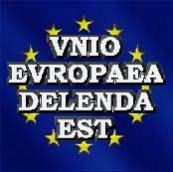Two things today are marked out as being significant in the EUSSRs march to supreme control.
Firstly
This report from Out-Law.com
The European Commission has published documents which it hopes will result in governments across Europe standardising the way they run their administrations. The Commission said the documents would help in making government services interoperable.
The Commission’s European Interoperability Strategy (EIS) and the European Interoperability Framework (EIF) will, it hopes, help EU citizens to interact with governments across the EU’s 27 member states without having to negotiate different kinds of systems.
Much of this is already in place in the UK (known as the Grid) and it dictates not only how national government delivers, but also local government, local services and regional bodies. We are in a state of flux remains, but it is not too late to pull out.
We are being reduced to mere provinces of the EUSSR, all acting in the same way taking orders from Brussels under their ‘EU One Nation’ programme. National identities, cultures and historical institutions are being erased.
For a more detailed breakdown of these EU documents and their impact, please visit Witterings from Witney.
Secondly
NeoConOpticon reports on A study commissioned by the European Parliament’s ‘Citizens’ Rights and Constitutional Affairs’ policy department which has produced a damning indictment of the European Security Research Programme (ESRP), reiterating and confirming many of the findings in Statewatch and TNI’s earlier Neoconopticon report. (highlights mine)
- With regard to the “public-private dialogue”: EU security research and development activities have been mainly driven by a concern to bring together representatives from the ministries of Defence and Interior of the Member States and Associate countries, and representatives of major companies from the defence and security industries. In the process, representatives from civil society and parliamentarians, as well as bodies and organisations in charge of civil liberties and fundamental freedoms, including data protection authorities and fundamental rights bodies, have been largely sidestepped. The outcome of this process is a dialogue that is limited in its scope, addressing security research through the concerns of security agencies and services and the industry, without taking into account the requirements flowing from the EU’s internal area of freedom.
– - With regard to security research undertaken in the framework of FP7-Security theme: an overview of current security research projects sponsored through FP7 show an unequal distribution of funding, which is concentrated on a small number of participating countries and a small number of organisations, mostly major defence and security companies and applied research institutions. In addition, a large proportion of these projects is dedicated to developing technologies of surveillance, to the detriment of a broader reflection on the impact of such technologies for citizens and persons concerned with the EU’s security policies.
– - With regard to future developments in the field of security research in the EU: plans for the future development of EU-level security research, including the European Research and Innovation Agenda recently proposed by ESRIF, do not fundamentally challenge the abovementioned trends. While these proposals indicate a growing awareness for questions of fundamental freedoms and rights, they remain overly framed by the concerns of the defence and security industry and national and European security agencies and services.
The study also contains updated information about the extent of arms industry involvement in FP7 (see pages 23-24 of the report, link below), confirming that “it is mostly large defence companies, the very same who have participated in the definition of EU-sponsored security research which are the main beneficiaries of FP7-ST funds”. The report analysed 91 FP7 projects, worth a total of €443,2 million, and found that “companies such as the Thales group are involved in roughly one third of the projects (27), representing more than half the FP7-ST (57%) in terms of projects’ total worth (€ 253.8 million)”.
The study recommends that a comprehensive evaluation of EU-funded security research and development to date should be conducted before any decision on future funding for security research in FP8 is taken.
Although transferring the ESRP to DG Research would be a most welcome initiative, it seems implausible given that one of the programme’s central objectives is “industrial competitiveness” – in other words developing a globally competitive European Homeland Security industry. The second recommendation, increased funding for rights and freedoms-based research, is much more likely to happen. The question we should be asking, however, is whether this can somehow ‘offset’ or ‘human-rights proof’ the kind of security envisaged by the security-industrial complex.
What is needed more than anything in FP8 is a fundamental realignment of priorities for the entire security research programme. It is time that MEPs paid due regard to the growing body of evidence before them.
The European Parliament study, “Review of security measures in the Research Framework Programme”, is available here.
.









All most worrying stuff, but couched in that briliantly opaque fashion.
Pingback: Tweets that mention The EUSSRs march to supreme control. | IanPJ on Politics -- Topsy.com
Pingback: The EUSSRs march to supreme control. | The Albion Alliance presents
Ta again for link IPJ!
Pingback: Making government services interoperable | The Albion Alliance presents
Pingback: The EUSSRs march to supreme control. | Centurean2′s Weblog
Just love that word “interoperable”. Who came up with that?
Pingback: EU to take over all 27 member states civil service | IanPJ on Politics
Pingback: EU to take over all 27 member states civil service….LIBLABCON MERCHANTS! | Centurean2′s Weblog